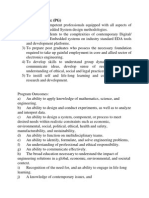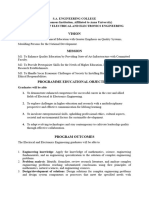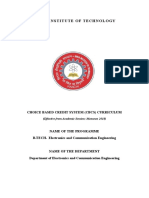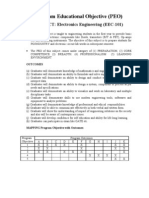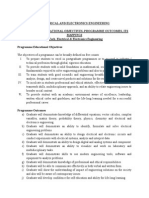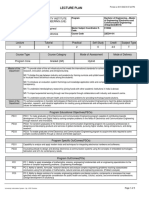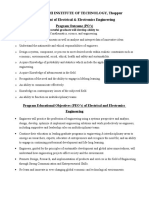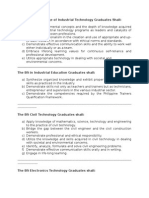0 ratings0% found this document useful (0 votes)
55 viewsProgram Outcomes: by The Time of Graduation, The Students of The Program Shall Have The Ability To
By graduation, students of the program should be able to: apply mathematics and science knowledge to solve electronics engineering problems; design and analyze experiments to interpret data; design systems to meet needs within constraints according to standards; function in multidisciplinary teams; identify, formulate, and solve electronics engineering problems; understand professional and ethical responsibility; communicate engineering activities to engineers and society; understand solutions' global, economic, environmental, and societal impacts; engage in lifelong learning; and use modern engineering tools and techniques.
Uploaded by
JenloDiamseCopyright
© © All Rights Reserved
We take content rights seriously. If you suspect this is your content, claim it here.
Available Formats
Download as DOCX, PDF, TXT or read online on Scribd
0 ratings0% found this document useful (0 votes)
55 viewsProgram Outcomes: by The Time of Graduation, The Students of The Program Shall Have The Ability To
By graduation, students of the program should be able to: apply mathematics and science knowledge to solve electronics engineering problems; design and analyze experiments to interpret data; design systems to meet needs within constraints according to standards; function in multidisciplinary teams; identify, formulate, and solve electronics engineering problems; understand professional and ethical responsibility; communicate engineering activities to engineers and society; understand solutions' global, economic, environmental, and societal impacts; engage in lifelong learning; and use modern engineering tools and techniques.
Uploaded by
JenloDiamseCopyright
© © All Rights Reserved
We take content rights seriously. If you suspect this is your content, claim it here.
Available Formats
Download as DOCX, PDF, TXT or read online on Scribd
You are on page 1/ 1
Program Outcomes
By the time of graduation, the students of the
program shall have the ability to:
apply knowledge of mathematics and science to solve Electronics
engineering problems
design and conduct experiments, as well as to analyze and
b
interpret data
a
design a system, component, or process to meet desired needs
within realistic constraints, in accordance with standards
d function in multidisciplinary and multi-cultural teams
e identify, formulate, and solve Electronics engineering problems
f understand professional and ethical responsibility
c
g
h
i
j
communicate effectively complex Electronics engineering activities
with the engineering community and with society at large
understand the impact of Electronics engineering solutions in a
global, economic, environmental, and societal context
recognize the need for, and engage in life-long learning
know contemporary issues
use techniques, skills, and modern engineering tools necessary for
Electronics engineering practice
know and understand engineering and management principles as a
l member and leader of a team, and to manage projects in a
multidisciplinary environment
understand at least one specialized field of Electronics engineering
m
practice.
k
You might also like
- It Is Generally Agreed That The Role of Strategy Is ToNo ratings yetIt Is Generally Agreed That The Role of Strategy Is To26 pages
- Program Outcomes: Engineering Fundamentals Appropriate To The DisciplineNo ratings yetProgram Outcomes: Engineering Fundamentals Appropriate To The Discipline2 pages
- Department of Electronics and Communication EngineeringNo ratings yetDepartment of Electronics and Communication Engineering6 pages
- Syllabus MATH 281 ENGINEERING DATA ANALYSISNo ratings yetSyllabus MATH 281 ENGINEERING DATA ANALYSIS24 pages
- Program Educational Objective (PEO) : SUBJECT: Electronics Engineering (EEC-101)No ratings yetProgram Educational Objective (PEO) : SUBJECT: Electronics Engineering (EEC-101)3 pages
- Program Outcomes (Pos) of Ece Department:: (A) Engineering Graduates Will Be Able ToNo ratings yetProgram Outcomes (Pos) of Ece Department:: (A) Engineering Graduates Will Be Able To1 page
- B Tech ECE COURSE STRCUTURE AND SYLLABUS FROM 2021 BATCH ONWARDS Modified 2 Mar 2022 PDFNo ratings yetB Tech ECE COURSE STRCUTURE AND SYLLABUS FROM 2021 BATCH ONWARDS Modified 2 Mar 2022 PDF301 pages
- Educational Opportunities: 1. Broad FoundationNo ratings yetEducational Opportunities: 1. Broad Foundation2 pages
- Program Educational Objectives-Program Learning Outcomes Connectivity MatrixNo ratings yetProgram Educational Objectives-Program Learning Outcomes Connectivity Matrix2 pages
- Syllabus CEPC 481 CIVIL ENGINEERING LAW ETHICS AND CONTRACTSNo ratings yetSyllabus CEPC 481 CIVIL ENGINEERING LAW ETHICS AND CONTRACTS24 pages
- 21LC06 21EC06 21TC06-Electric Circuits - Course Plan - AY 22 - 23No ratings yet21LC06 21EC06 21TC06-Electric Circuits - Course Plan - AY 22 - 2317 pages
- Program Outcome Ece PO1 PO2 PO3 PO4 PO5 PO6 PO7 PO8 PO9 PO10 PO11 PO12No ratings yetProgram Outcome Ece PO1 PO2 PO3 PO4 PO5 PO6 PO7 PO8 PO9 PO10 PO11 PO121 page
- M S Engineering College: Digital Electronics Lab ManualNo ratings yetM S Engineering College: Digital Electronics Lab Manual42 pages
- Rise Krishna Sai Prakasam Group of Institutions::Ongole: Vision of The InstituteNo ratings yetRise Krishna Sai Prakasam Group of Institutions::Ongole: Vision of The Institute3 pages
- Ece 1-Bsece Principles of Communications (LEC) : Technological University of The Philippines Taguig CityNo ratings yetEce 1-Bsece Principles of Communications (LEC) : Technological University of The Philippines Taguig City5 pages
- Ee23432 Lic Lab Manual Updated 19012025No ratings yetEe23432 Lic Lab Manual Updated 1901202558 pages
- Syllabus CEBS 101 CIVIL ENGINEERING ORIENTATIONNo ratings yetSyllabus CEBS 101 CIVIL ENGINEERING ORIENTATION20 pages
- CBCS Based EEE Course Curriculum Feb 2024No ratings yetCBCS Based EEE Course Curriculum Feb 2024341 pages
- 1.course File - POWER SEMICONDUCTOR DRIVESNo ratings yet1.course File - POWER SEMICONDUCTOR DRIVES14 pages
- CBCS - UG BTECH CBCS 2021 - 2022 & 2022 Onwards SyllabusNo ratings yetCBCS - UG BTECH CBCS 2021 - 2022 & 2022 Onwards Syllabus268 pages
- Teaching and Learning in STEM With Computation, Modeling, and Simulation Practices: A Guide for Practitioners and ResearchersFrom EverandTeaching and Learning in STEM With Computation, Modeling, and Simulation Practices: A Guide for Practitioners and ResearchersNo ratings yet
- Polangui Campus: Bicol University Polangui, AlbayNo ratings yetPolangui Campus: Bicol University Polangui, Albay6 pages
- THE BU College of Industrial Technology Graduates ShallNo ratings yetTHE BU College of Industrial Technology Graduates Shall2 pages
- A Tale of Two Airlines in The Information AgeNo ratings yetA Tale of Two Airlines in The Information Age2 pages
- Information Theory, Shannon Limit and Error Correction Codes For Terrestrial DTV BroadcastingNo ratings yetInformation Theory, Shannon Limit and Error Correction Codes For Terrestrial DTV Broadcasting37 pages
- Experimental Psychology: An Introduction: Prof. Bernardo Fernandez IINo ratings yetExperimental Psychology: An Introduction: Prof. Bernardo Fernandez II42 pages
- Theoretical Framework and Hypothesis DevelopmentNo ratings yetTheoretical Framework and Hypothesis Development26 pages
- Department of Education: School Level Training ProposalNo ratings yetDepartment of Education: School Level Training Proposal7 pages
- Cross-Cultural Issues in Employment Counselling For Internationally Trained ProfessionalsNo ratings yetCross-Cultural Issues in Employment Counselling For Internationally Trained Professionals26 pages
- A Causal Comparative Study On The Effect of Proficiency-Based Education On School ClimateNo ratings yetA Causal Comparative Study On The Effect of Proficiency-Based Education On School Climate127 pages
- C. Typology of Family Nursing Diagnosis 2nd Level AssessmentNo ratings yetC. Typology of Family Nursing Diagnosis 2nd Level Assessment1 page
- Manly Palmer Hall (18.03.1901) - Genetic MatrixNo ratings yetManly Palmer Hall (18.03.1901) - Genetic Matrix35 pages
- An Analysis of Employee Job Satisfaction: A Study On United Commercial Bank LimitedNo ratings yetAn Analysis of Employee Job Satisfaction: A Study On United Commercial Bank Limited16 pages
- McCullough, Tsang & Brion 2003 Personality Traits in Adolescence As Predictors of Religiousness in Early Adulthood - Findings From The Terman Longitudinal StudyNo ratings yetMcCullough, Tsang & Brion 2003 Personality Traits in Adolescence As Predictors of Religiousness in Early Adulthood - Findings From The Terman Longitudinal Study13 pages
- B1 Writing Assessment 8 My Oral Presentation PDFNo ratings yetB1 Writing Assessment 8 My Oral Presentation PDF4 pages
- Closer Look On The Plights of The Parentless College Students: A Convergent Parallel AnalysisNo ratings yetCloser Look On The Plights of The Parentless College Students: A Convergent Parallel Analysis18 pages






